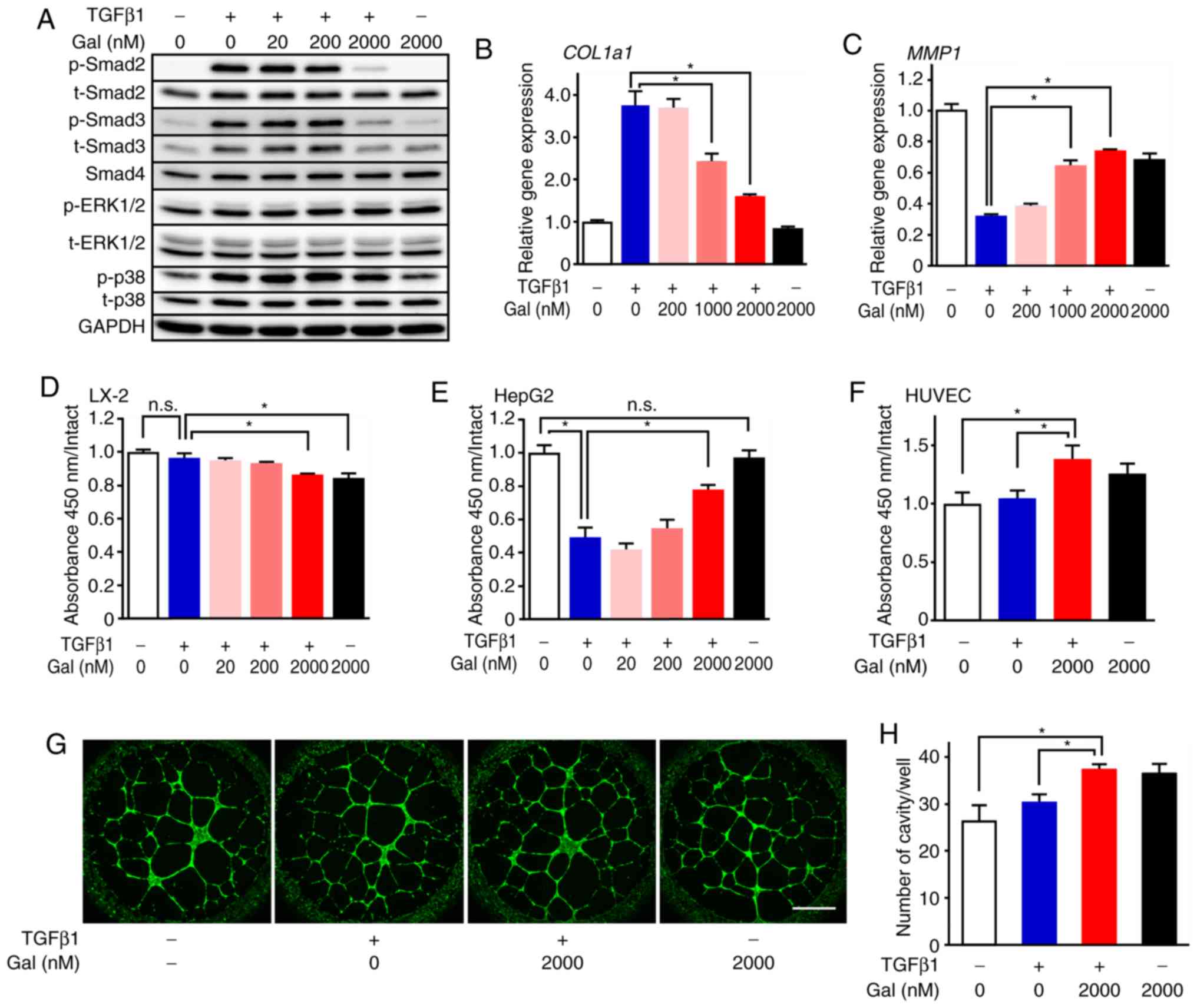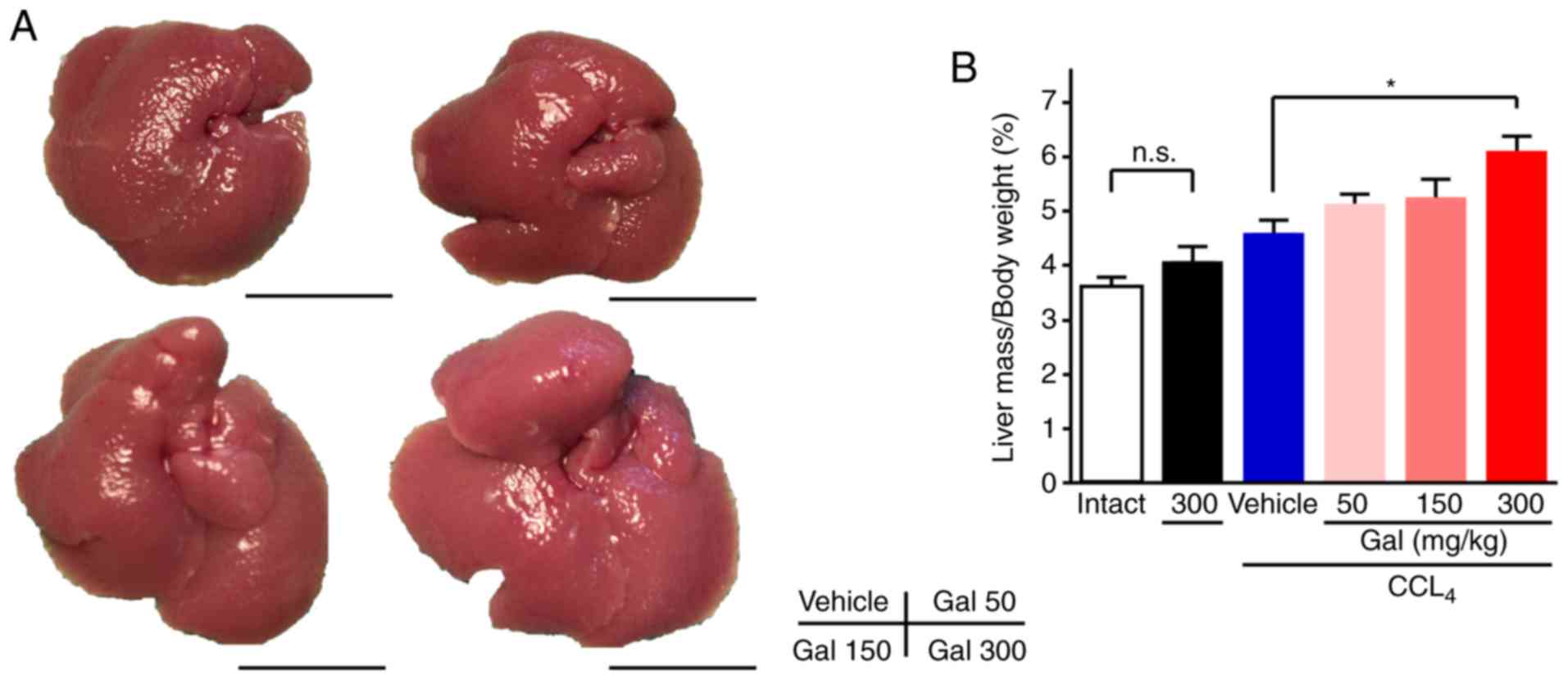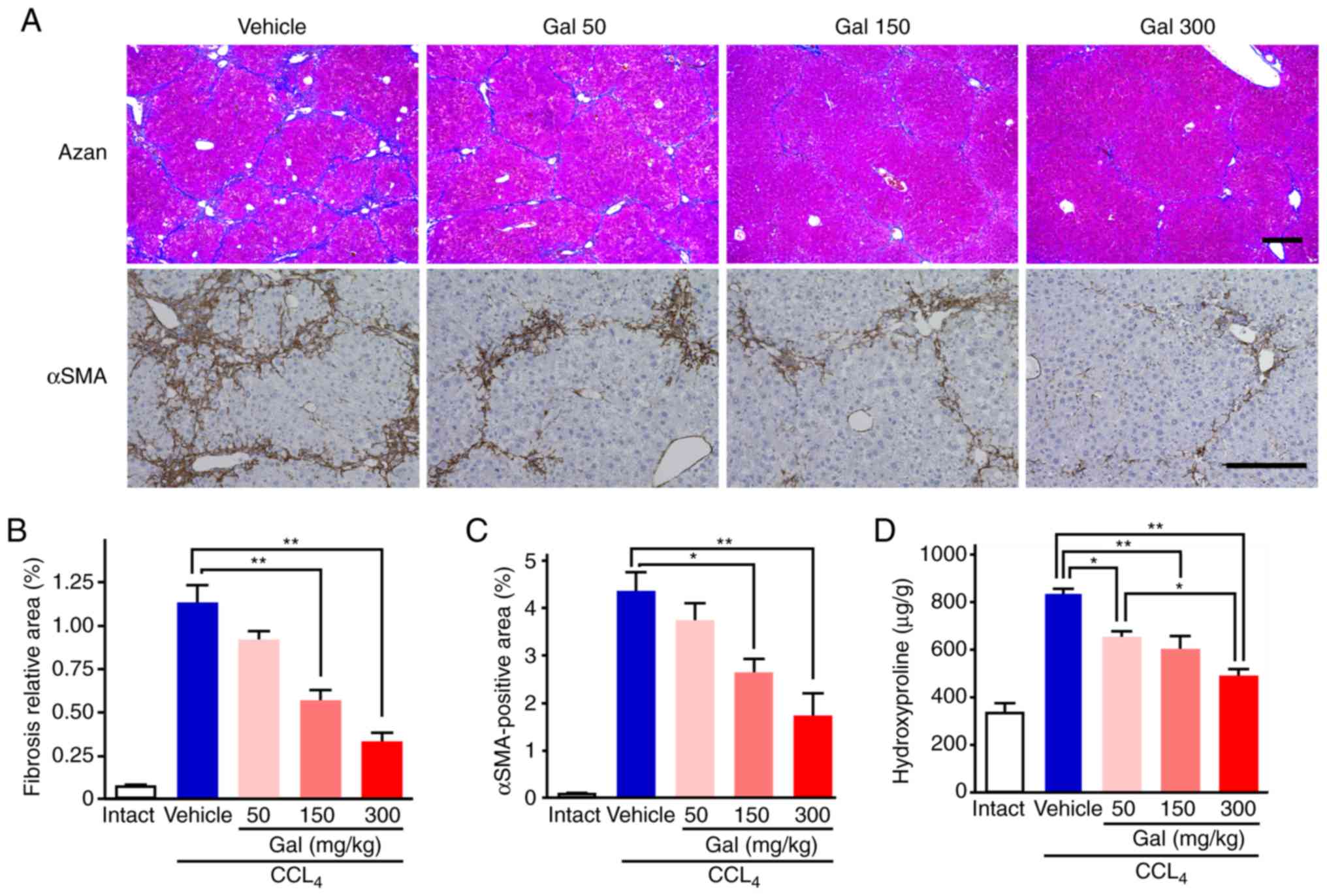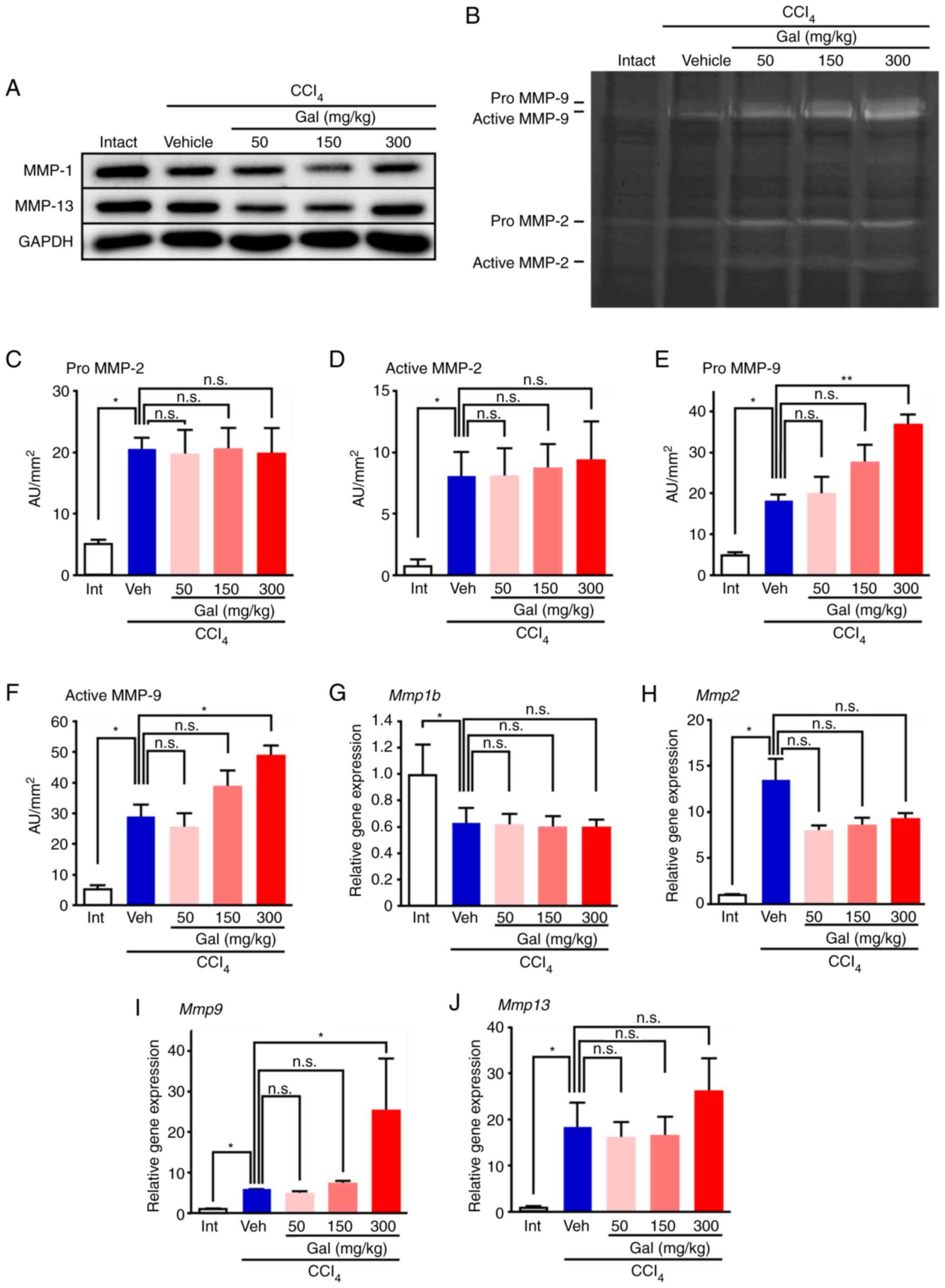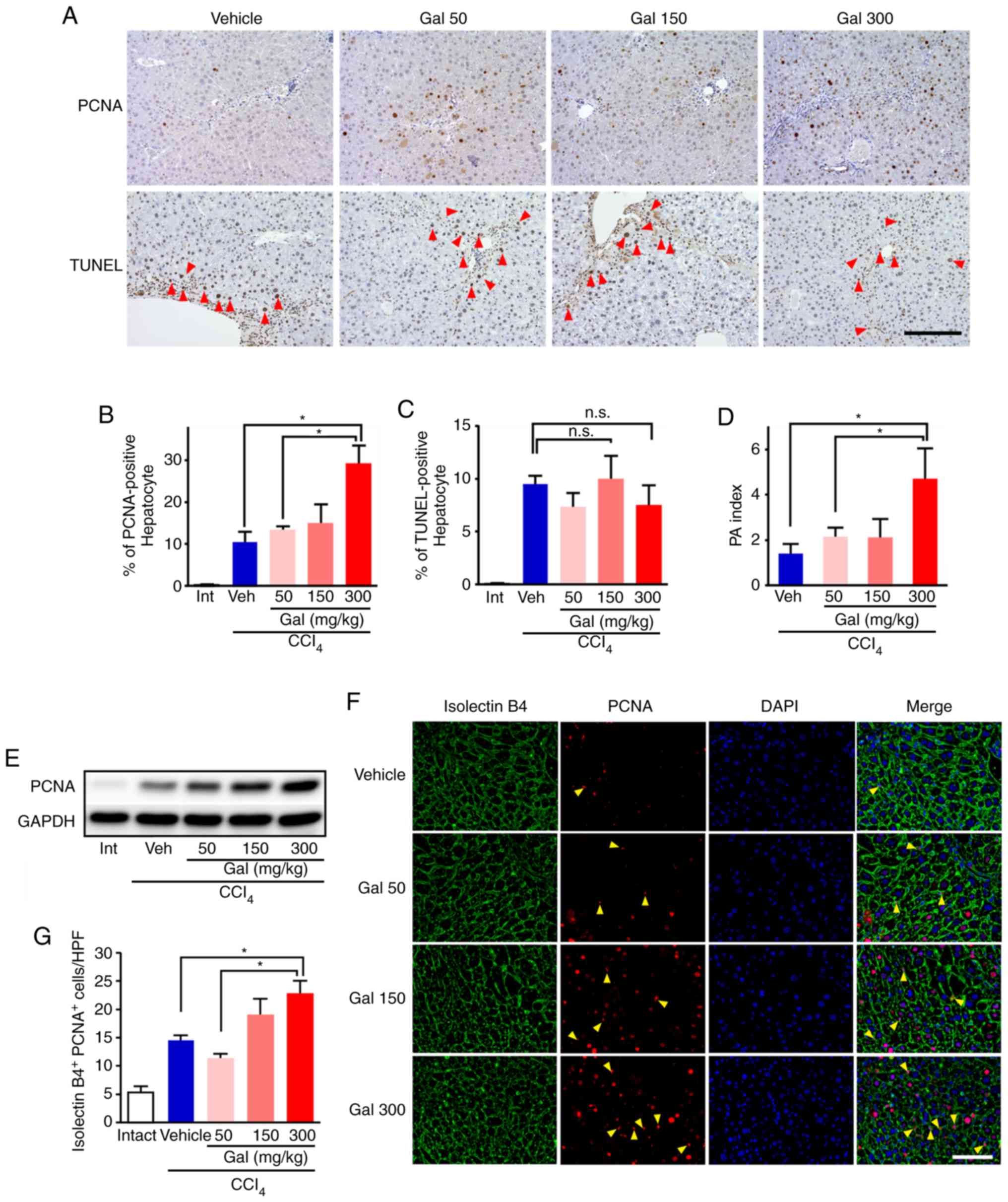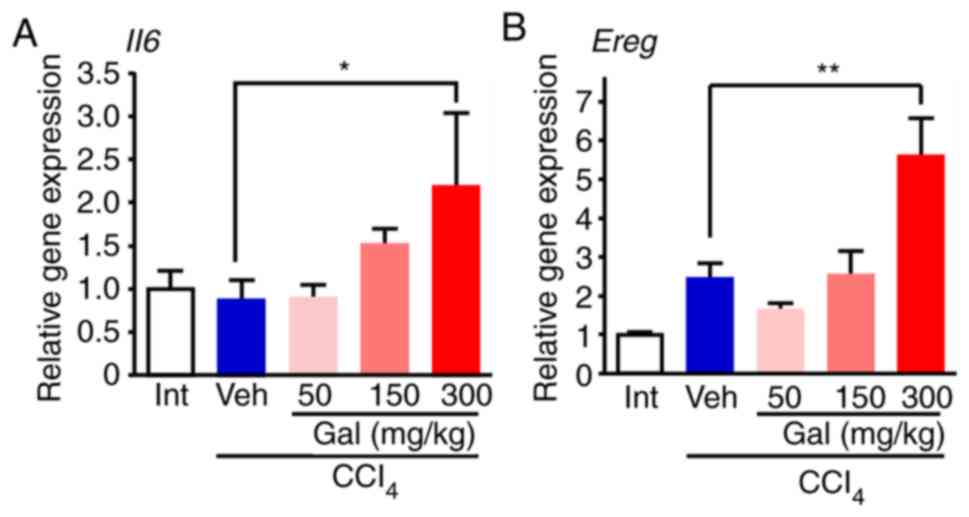|
1
|
Schuppan D and Afdhal NH: Liver cirrhosis.
Lancet. 371:838–851. 2008. View Article : Google Scholar : PubMed/NCBI
|
|
2
|
Fattovich G, Stroffolini T, Zagni I and
Donato F: Hepatocellular carcinoma in cirrhosis: Incidence and risk
factors. Gastroenterology. 127(5 Suppl 1): S35–S50. 2004.
View Article : Google Scholar : PubMed/NCBI
|
|
3
|
Tarao K, Nozaki A, Ikeda T, Sato A,
Komatsu H, Komatsu T, Taguri M and Tanaka K: Real impact of liver
cirrhosis on the development of hepatocellular carcinoma in various
liver diseases-meta-analytic assessment. Cancer Med. 8:1054–1065.
2019. View Article : Google Scholar : PubMed/NCBI
|
|
4
|
Tsuchida T and Friedman SL: Mechanisms of
hepatic stellate cell activation. Nat Rev Gastroenterol Hepatol.
14:397–411. 2017. View Article : Google Scholar : PubMed/NCBI
|
|
5
|
Nguyen LN, Furuya MH, Wolfraim LA, Nguyen
AP, Holdren MS, Campbell JS, Knight B, Yeoh GC, Fausto N and Parks
WT: Transforming growth factor-beta differentially regulates oval
cell and hepatocyte proliferation. Hepatology. 45:31–41. 2007.
View Article : Google Scholar
|
|
6
|
Nakamura T, Sakata R, Ueno T, Sata M and
Ueno H: Inhibition of transforming growth factor beta prevents
progression of liver fibrosis and enhances hepatocyte regeneration
in dimethylnitro-samine-treated rats. Hepatology. 32:247–255. 2000.
View Article : Google Scholar : PubMed/NCBI
|
|
7
|
Ueno H, Sakamoto T, Nakamura T, Qi Z,
Astuchi N, Takeshita A, Shimizu K and Ohashi H: A soluble
transforming growth factor beta receptor expressed in muscle
prevents liver fibrogenesis and dysfunction in rats. Hum Gene Ther.
11:33–42. 2000. View Article : Google Scholar : PubMed/NCBI
|
|
8
|
Nakamura T, Ueno T, Sakamoto M, Sakata R,
Torimura T, Hashimoto O, Ueno H and Sata M: Suppression of
transforming growth factor-beta results in upregulation of
transcription of regeneration factors after chronic liver injury. J
Hepatol. 41:974–982. 2004. View Article : Google Scholar : PubMed/NCBI
|
|
9
|
Yingling JM, Blanchard KL and Sawyer JS:
Development of TGF-beta signalling inhibitors for cancer therapy.
Nat Rev Drug Discov. 3:1011–1022. 2004. View Article : Google Scholar : PubMed/NCBI
|
|
10
|
Herbertz S, Sawyer JS, Stauber AJ,
Gueorguieva I, Driscoll KE, Estrem ST, Cleverly AL, Desaiah D, Guba
SC, Benhadji KA, et al: Clinical development of galunisertib
(LY2157299 monohydrate), a small molecule inhibitor of transforming
growth factor-beta signaling pathway. Drug Des Devel Ther.
9:4479–4499. 2015.PubMed/NCBI
|
|
11
|
Yingling JM, McMillen WT, Yan L, Huang H,
Sawyer JS, Graff J, Clawson DK, Britt KS, Anderson BD, Beight DW,
et al: Preclinical assessment of galunisertib (LY2157299
monohydrate), a first-in-class transforming growth factor-β
receptor type I inhibitor. Oncotarget. 9:6659–6677. 2017.
View Article : Google Scholar
|
|
12
|
Ikeda M, Morimoto M, Tajimi M, Inoue K,
Benhadji KA, Lahn MMF and Sakai D: A phase Ib study of transforming
growth factor-beta receptor I inhibitor galunisertib in combination
with sorafenib in Japanese patients with unresectable
hepatocellular carcinoma. Invest New Drugs. 37:118–126. 2019.
View Article : Google Scholar
|
|
13
|
Luangmonkong T, Suriguga S, Bigaeva E,
Boersema M, Oosterhuis D, de Jong KP, Schuppan D, Mutsaers HAM and
Olinga P: Evaluating the antifibrotic potency of galunisertib in a
human ex vivo model of liver fibrosis. Br J Pharmacol.
174:3107–3117. 2017. View Article : Google Scholar : PubMed/NCBI
|
|
14
|
Livak KJ and Schmittgen TD: Analysis of
relative gene expression data using real-time quantitative PCR and
the 2(-Delta Delta C(T)) method. Methods. 25:402–408. 2001.
View Article : Google Scholar
|
|
15
|
Nakamura T, Torimura T, Sakamoto M,
Hashimoto O, Taniguchi E, Inoue K, Sakata R, Kumashiro R, Murohara
T, Ueno T and Sata M: Significance and therapeutic potential of
endothelial progenitor cell transplantation in a cirrhotic liver
rat model. Gastroenterology. 133:91–107.e101. 2007. View Article : Google Scholar : PubMed/NCBI
|
|
16
|
Gueorguieva I, Cleverly AL, Stauber A,
Sada Pillay N, Rodon JA, Miles CP, Yingling JM and Lahn MM:
Defining a therapeutic window for the novel TGF-β inhibitor
LY2157299 monohydrate based on a pharmacokinetic/pharmacodynamic
model. Br J Clin Pharmacol. 77:796–807. 2014. View Article : Google Scholar : PubMed/NCBI
|
|
17
|
Faivre S, Santoro A, Kelley RK, Gane E,
Costentin CE, Gueorguieva I, Smith C, Cleverly A, Lahn MM, Raymond
E, et al: Novel transforming growth factor beta receptor I kinase
inhibitor galunisertib (LY2157299) in advanced hepatocellular
carcinoma. Liver Int. 39:1468–1477. 2019. View Article : Google Scholar : PubMed/NCBI
|
|
18
|
Serova M, Tijeras-Raballand A, Dos Santos
C, Albuquerque M, Paradis V, Neuzillet C, Benhadji KA, Raymond E,
Faivre S and de Gramont A: Effects of TGF beta signalling
inhibition with galunisertib (LY2157299) in hepatocellular
carcinoma models and in ex vivo whole tumor tissue samples from
patients. Oncotarget. 6:21614–21627. 2015. View Article : Google Scholar : PubMed/NCBI
|
|
19
|
Heldin CH and Moustakas A: Signaling
receptors for TGF-β family members. Cold Spring Harb Perspect Biol.
8:a0220532016. View Article : Google Scholar
|
|
20
|
Yuan W and Varga J: Transforming growth
factor-beta repression of matrix metalloproteinase-1 in dermal
fibroblasts involves Smad3. J Biol Chem. 276:38502–38510. 2001.
View Article : Google Scholar : PubMed/NCBI
|
|
21
|
Breuhahn K, Longerich T and Schirmacher P:
Dysregulation of growth factor signaling in human hepatocellular
carcinoma. Oncogene. 25:3787–3800. 2006. View Article : Google Scholar : PubMed/NCBI
|
|
22
|
Coulouarn C, Factor VM and Thorgeirsson
SS: Transforming growth factor-beta gene expression signature in
mouse hepatocytes predicts clinical outcome in human cancer.
Hepatology. 47:2059–2067. 2008. View Article : Google Scholar : PubMed/NCBI
|
|
23
|
Bataller R and Brenner DA: Liver fibrosis.
J Clin Invest. 115:209–218. 2005. View Article : Google Scholar : PubMed/NCBI
|
|
24
|
Ram M, Sherer Y and Shoenfeld Y: Matrix
metalloproteinase-9 and autoimmune diseases. J Clin Immunol.
26:299–307. 2006. View Article : Google Scholar : PubMed/NCBI
|
|
25
|
Hammad S, Cavalcanti E, Werle J, Caruso
ML, Dropmann A, Ignazzi A, Ebert MP, Dooley S and Giannelli G:
Galunisertib modifies the liver fibrotic composition in the Abcb4Ko
mouse model. Arch Toxicol. 92:2297–2309. 2018. View Article : Google Scholar : PubMed/NCBI
|
|
26
|
Iimuro Y, Nishio T, Morimoto T, Nitta T,
Stefanovic B, Choi SK, Brenner DA and Yamaoka Y: Delivery of matrix
metal-loproteinase-1 attenuates established liver fibrosis in the
rat. Gastroenterology. 124:445–458. 2003. View Article : Google Scholar : PubMed/NCBI
|
|
27
|
Endo H, Niioka M, Sugioka Y, Itoh J,
Kameyama K, Okazaki I, Ala-Aho R, Kähäri VM and Watanabe T: Matrix
metallopro-teinase-13 promotes recovery from experimental liver
cirrhosis in rats. Pathobiology. 78:239–252. 2011. View Article : Google Scholar
|
|
28
|
Fallowfield JA, Mizuno M, Kendall TJ,
Constandinou CM, Benyon RC, Duffield JS and Iredale JP:
Scar-associated macrophages are a major source of hepatic matrix
metallopro-teinase-13 and facilitate the resolution of murine
hepatic fibrosis. J Immunol. 178:5288–5295. 2007. View Article : Google Scholar : PubMed/NCBI
|
|
29
|
Karkampouna S, Goumans MJ, Ten Dijke P,
Dooley S and Kruithof-de Julio M: Inhibition of TGFβ type I
receptor activity facilitates liver regeneration upon acute
CCl4 intoxication in mice. Arch Toxicol. 90:347–357.
2016. View Article : Google Scholar
|
|
30
|
Oe S, Lemmer ER, Conner EA, Factor VM,
Levéen P, Larsson J, Karlsson S and Thorgeirsson SS: Intact
signaling by transforming growth factor beta is not required for
termination of liver regeneration in mice. Hepatology.
40:1098–1105. 2004. View Article : Google Scholar : PubMed/NCBI
|
|
31
|
Stauber AJ, Credille KM, Truex LL,
Ehlhardt WJ and Young JK: Nonclinical safety evaluation of a
transforming growth factor β receptor I kinase inhibitor in fischer
344 rats and beagle dogs. J Clin Pract. 4:1962014.
|
|
32
|
Kogure K, Omata W, Kanzaki M, Zhang YQ,
Yasuda H, Mine T and Kojima I: A single intraportal administration
of follistatin accelerates liver regeneration in partially
hepatectomized rats. Gastroenterology. 108:1136–1142. 1995.
View Article : Google Scholar : PubMed/NCBI
|
|
33
|
Ichikawa T, Zhang YQ, Kogure K, Hasegawa
Y, Takagi H, Mori M and Kojima I: Transforming growth factor beta
and activin tonically inhibit DNA synthesis in the rat liver.
Hepatology. 34:918–925. 2001. View Article : Google Scholar : PubMed/NCBI
|
|
34
|
Fields SZ, Parshad S, Anne M, Raftopoulos
H, Alexander MJ, Sherman ML, Laadem A, Sung V and Terpos E: Activin
receptor antagonists for cancer-related anemia and bone disease.
Expert Opin Investig Drugs. 22:87–101. 2013. View Article : Google Scholar
|
|
35
|
Liu Z, Kobayashi K, van Dinther M, van
Heiningen SH, Valdimarsdottir G, van Laar T, Scharpfenecker M,
Löwik CW, Goumans MJ, Ten Dijke P and Pardali E: VEGF and
inhibitors of TGFbeta type-I receptor kinase synergistically
promote blood-vessel formation by inducing alpha5-integrin
expression. J Cell Sci. 122:3294–3302. 2009. View Article : Google Scholar : PubMed/NCBI
|
|
36
|
Nakamura T, Tsutsumi V, Torimura T, Naitou
M, Iwamoto H, Masuda H, Hashimoto O, Koga H, Abe M, Ii M, et al:
Human peripheral blood CD34-positive cells enhance therapeutic
regeneration of chronically injured liver in nude rats. J Cell
Physiol. 227:1538–1552. 2012. View Article : Google Scholar
|
|
37
|
Tao Y, Wang M, Chen E and Tang H: Liver
regeneration: Analysis of the main relevant signaling molecules.
Mediators Inflamm. 2017:42563522017. View Article : Google Scholar : PubMed/NCBI
|
|
38
|
Tomita K, Haga H, Mizuno K, Katsumi T,
Sato C, Okumoto K, Nishise Y, Watanabe H, Saito T and Ueno Y:
Epiregulin promotes the emergence and proliferation of adult liver
progenitor cells. Am J Physiol Gastrointest Liver Physiol.
307:G50–G57. 2014. View Article : Google Scholar : PubMed/NCBI
|















